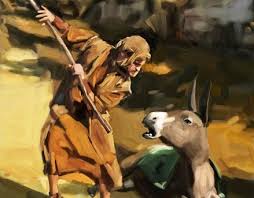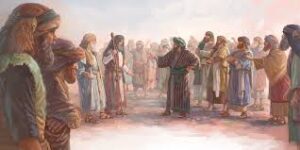They Have Taken the Way of Cain,
Rushed into Balaam’s Error,
and have been Destroyed by Korah’s Rebellion
Jude 11
They have taken the way of Cain, rushed into Balaam’s error, and have been destroyed by Korah’s rebellion DIG: How do these three examples from history relate to the problems of unbelief, immorality, violence, and rebellion? What is the common thread in all three of them?
REFLECT: How do these three examples convey the certainty, severity and rightness of the LORD’s judgment? Has there been an issue with obedience in your life? On a scale of 1 to 10, with 10 not being perfect, but real obedient, how are you doing now? What do you attribute that to?
Woe to them! They have taken the way of Cain; they have rushed for profit into Balaam’s error; they have been destroyed by Korah’s rebellion (Jude 11).
In this section, the Holy Spirit inspires Jude to write about turning away from the truth. Yeshua said of Himself: I AM the Way – and the Truth and the Life; no one comes to the Father except through Me (John 14:6 CJB). The apostates are ones who will not tolerate having the Son of man reigning over them. They knowingly exchange the way of Cain for the way of Christ, the error of Balaam for the truth of Messiah, and the perishing of Korah for a life with the Savior.
We can look at this verse in a different light if we translate it more literally. In the way of Cain they went away, and in the wandering of Balaam for profit they rushed [headlong], and in the rebellion of Korah they were destroyed. Apostasy begins with a way other than ADONAI, it leads to wandering, and then it becomes a rebellion. Apostates enter that false way, they rush headlong in that wandering, and they are destroyed in that rebellion.66
The sixth triad is found here in verse 11. Jude points out that the present false teachers are just like these sinners during the Dispensation of the Torah. The Gnostics used Cain, Balaam and Korah as positive examples . . . so Jude used them as examples of deprivation (to see link click Ac – The Book of Jude from a Jewish Perspective: Purpose). The apostates sinned in three different ways, so Jude says: Woe to them. Woe is a pronouncement of judgment. Jude followed the example of Christ (Matthew 23:13-16, 23-29) and the prophets (Isaiah 3:9-11, 5:8-23, 29:15, 30:1, 31:1; Jeremiah 13:27, 23:1; Ezeki’el 13:3, 16:23, 34:2; Hosea 7:13; Zechariah 11:17) in pronouncing God’s judgment on the apostates. The word translated woe (ouai) is an emotional cry that means something like O how horrible it will be!

First, they have taken the way, literally went away, of Cain (11a). Cain is an example of someone who seeks their own way to ADONAI rather than to choosing the way that God has ordained. Cain was the first child of Adam and Eve, having been born some time after the Fall (see my commentary on Genesis Bj – Your Brother’s Blood Cries Out to Me from the Ground). The fact that Cain’s offering was unacceptable begs for the conclusion that the LORD had told him that a blood sacrifice was the necessary path to fellowship with Him. Knowing this, Cain chose to go his own disobedient way and worship as he pleased, saying, in effect, “Not Your will, God, but my will be done! This revealed the irreverent blasphemy of his heart, as he rejected the LORD’s revelation (Genesis 3:21), and lived by his own self-styled instinct and pride in what he had produced.
The Greek word for way is hodos, meaning a road, a way. The most compelling contrast between two roads to be found in all Scripture was given by the Messiah: Enter through the narrow gate. For wide is the gate and broad is the road that leads to destruction, and many enter through it. But small is the gate and narrow the road that leads to life, and only a few find it (Matthew 7:13-14). Jesus spoke of two roads, two gates, two groups of people and two destinies that have divided humanity from the time of Cain and Abel until today. The apostates will not find the small gate, but they will have plenty of company on the broad road that leads to destruction.
The people of whom Jude wrote went away because of this broad road. The Greek word went away, means to pass from one place to another, or to depart. The same word appears in Matthew 25:41: Depart from Me, you who are accursed, into the eternal fire prepared for the devil and his fallen angels. Jude is speaking of those who were enlightened about the truth of Yeshua Messiah and were convicted of it. But they intentionally, voluntarily departed from it. In another day they will be compelled to depart from Christ forever. The free choice of the present determines the unchangeable destiny of the future.67
The rabbis taught that Cain exemplified the cynical man. The Jerusalem Targum, an Aramaic paraphrase of the Pentateuch, presents Cain as saying, “There is no judgment, no judge, no future life; no reward will be given to the righteous, and no judgment will be imposed on the wicked.” We cannot be sure Jude had this saying in mind. Nonetheless, he is charging the counterfeit believers with defying God and denying the moral order of the world. It remains true until this very day that those who choose sin still have to face Jesus (see my commentary on Revelation Fo – The Great White Throne Judgment) and learn that no one can defy the moral order of the world and escape the consequences.68
Cain stands for the cynical, materialistic character that defies God and despises man. He is devoid of faith and love. As such, Cain is a picture of the people whom Jude is writing to us about. But Cain is also chosen for another reason. The rabbis also teach that he corrupted the human race, saying, “He became their instructor in wicked practices” (Josephus Antiquities i:61). That is exactly Jude’s argument with the false teachers.69
In light of all the similarities, Jude could refer to the proud, self-willed apostates as those who have taken the way of Cain because they have gone their own immoral way to ADONAI. Cain was rebellious and disobedient, and when the LORD did not accept his offering, he responded in jealous anger – even murdering his brother Abel. The writer of Hebrews offered this commentary on the tragic episode: By faith, Abel offered God a better sacrifice than Cain did. By faith he was commended as a righteous man, when God spoke well of his offerings. And by faith he still speaks, even though he is dead (Hebrews 11:5).
John adds this and made it plain his warning was directed to believers: This is the message you believers have heard from the beginning: We should love one another. Do not be like Cain, who belonged to the evil one and murdered his brother. Why did he murder him? Because his own actions were evil and his brother’s were righteous (First John 3:12). Before telling his readers exactly what love is, he first told them what love is not. The reason for the murder (see my commentary on Exodus Dp – You Shall Not Murder) was Cain’s resentment of his brother’s superior righteousness. By taking the way of Cain, these apostates also hate the superior righteousness of believers. They come into the congregations of God and pretend to be one of the sheep. But they are actually filled with resentment. They do not love other believers as brothers and sisters in the faith. They come, like a thief, to steal and kill and destroy (John 10:10).

Second, they have rushed [headlong] for profit into Balaam’s error (11b). These false teachers stumbled down the same path as did Cain. Here, Jude unmasks the fundamental motive behind the religious interests of these apostates. They do it for pay (Psalm 10:3; Micah 3:11; First Timothy 6:10; Second Peter 2:3). Unlike the LORD’s true shepherds (First Timothy 3:3; Titus 1:7; First Peter 5:2), these false teachers follow the error of Balaam, rushing headlong into greed and debauchery. They are lovers of pleasure rather than lovers of God (Second Timothy 3:4).
Balaam is probably the best example in the Bible of a so-called prophet who was motivated by financial gain. Having been hired by Balak, the king of Moab, Balaam attempted to curse the people of Isra’el as they wandered in the wilderness (Numbers 22:1-6). Balak saw the Israelites as a military threat and hoped to defeat them with the help of Balaam. He already had a reputation as prophet-for-hire and came from a city along the Euphrates River that was known to have produced other such phony prophets.
At first Balaam appeared to be a faithful prophet (Numbers 22:7-21). However, even in this passage he seems to delay his decision in the hope of negotiating more money out of Balak (Numbers 22:13). Even though Balaam claimed to speak only the words of God, the LORD knew that he actually wanted to curse Israel for money. But ADONAI used an angel along with Balaam’s donkey to prevent him from carrying out his wicked plan (Numbers 22:22-35). As a prophet for hire, Balaam is a prime example of false teachers, or those who love money and reputation more than faithfulness and obedience.
They have left the straight way and wandered off to follow the way of Balaam son of Beor, who loved the wages of wickedness (Second Peter 2:15). The straight way is a metaphor in the TaNaKh indicating obedience to God’s Word (Genesis 18:19; First Samuel 12:23; Proverbs 8:20; also see Acts 13:10). They have left describes a deliberate rebellion against Scripture. Having rejected God’s Word, the false teachers of Peter’s day, and in every age, refuse to walk in obedience, choosing instead to wander away despite the eternal consequences (Jude 13). In doing so, they follow the way of Balaam.
Though Balaam had been unsuccessful in cursing the people of Isra’el, he evidently managed to play a role in their seduction by the Ba’al cult at Peor (Numbers 31:16). He recommended that the women of Moab and Midian entice the Jewish men sexually. Part of the enticement included the worship of their gods. The plot worked, Isra’el was cursed, and many died in a plague. The teaching of Balaam was encouragement of corruption by intermarriage, resulting in sexual immorality and idolatry. No doubt in the city of Pergamum, intermarriage with the pagan world was a real problem (see my commentary on Revelation Bb – The Church at Pergamum). Because civil and religious life were so intertwined, for believers to accept social engagements probably meant some involvement with paganism. Like Balaam, these false teachers use their phony gifts of prophecy to become wealthy and make a name for themselves.
The Bible tells us what Jude means when he says: They have rushed [headlong] for profit into Balaam’s error. It is the error of all apostates, the sacrificing of eternal riches for temporal reward. It is running riot on the broad road that leads to destruction (Matthew 7:13). It is lust for the pleasures of sin for a short time and greed for the treasures of Egypt (Hebrews 11:25-26). It is a reckless desire to gain some part of the world even at the loss of the soul. What good is it (Mark 8:36)? These false prophets of every age follow the example of Demas who deserted God’s people because he loved this world (Second Timothy 4:10).70
One last time the Ruach introduces a character from the TaNaKh through Jude, to complete this brief description of apostasy found in three men who fell away from God. It should be noted that all three statements in Jude 11 are in the past tense. It is sobering to realize that in the sight of ADONAI those who have taken the way of Cain have already been destroyed. But not only that, the security of the believer is also in the past tense: And those He called, He also justified; those He justified, He also glorified (Rom 8:30). In other words, the doom of the apostates is just as sure as the glorification of the righteous.

Thirdly, they have been destroyed in Korah’s rebellion (11c). Numbers 16 presents the story of Korah, a cousin of Moses. As a Levite and a Kohathite, Korah had important duties in the Tabernacle (Numbers 1:50-51, 3:6-8, 18:3; Deuteronomy 10:8, First Chronicles 15:2). But when he was not chosen to be a priest, he became furious. To show his contempt, Korah recruited Dathan, Abiram, and 250 other men to join him in a rebellion against the leadership of Moshe. Such an aspiration was a challenge to neither Moses nor Aaron, but rather an assault on the sovereign pleasure of God Himself. YHVH had plainly delegated the office of high priest to the family of Aaron and that family only.
In Korah’s deceitful accusation of Moses, the rebel said: You have gone too far! The whole community is holy, every one of them, and ADONAI is with them. Why then do you set yourself above the LORD’s assembly (Numbers 16:3)? In his pride, Korah disputed the idea that the people needed a leader and mediator, someone who could speak for YHVH and teach them God’s truth (Exodus 4:10-17). He openly rebelled against the authority that ADONAI had given Moses, and he actively rallied others to support his spiritual mutiny.
The LORD, however, responded by ending the rebellion of Korah in an abrupt and decisive fashion: As soon as he finished saying all this, the ground under them split apart and the earth opened its mouth and swallowed them, with their households and all Korah’s men and all their possessions. They went down to the grave, with everything they owned; the earth closed over them, and they perished and were gone from the community. At their cries, all the Israelites around them fled, shouting, “The earth is going to swallow us too!” And fire came out of from ADONAI and consumed the 250 men who were offering the incense with their censers (Numbers 16:31-35). Many of today’s false teachers have significant followings, composed of people who will share their judgment (First Timothy 1:1-4). Yet, like Korah and his supporters, all apostate rebels will eventually experience God’s wrath (Mark 3:29; John 15:6; Hebrews 10:26-31; Rev 20:10-15).71
Like Cain, these wolves in sheep’s clothing lack the love of other believers and have secretly slipped in among us; like Balaam they are motivated by greed and are guilty of debauchery; and like Korah, they are guilty of false teaching and rebellion.



Leave A Comment